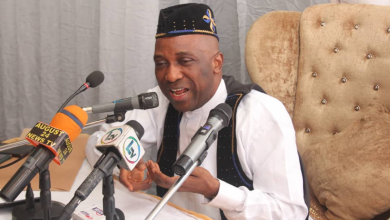100 days: Tinubu inherited battered economy – FG


President Bola Tinubu inherited a shattered economy, but in his 100 days in office, the Federal Government announced on Tuesday.
Although the withdrawal of fuel subsidies was hailed by the FG as “a Sword of Damocles that hung over Nigeria for decades,” the President has sown the seeds of national transformation, progress, and overall development despite the difficulties.
“The President has sown the seeds of national reform, progress, and all-around development, notwithstanding the challenges of this moment. We urge Nigerians and labor unions to be supportive of the government and to be more empathetic. To achieve the glory of a larger Nigeria, we must keep up our diligent work and boldly go forward, the FG stated.
These remarks were made in a statement headlined “President Tinubu’s 100 days of steady progress and national rejuvenation” by Mallam Mohammed Idris, the minister of information and national orientation.
He claims that precisely one hundred days ago, President Tinubu took office as the 16th leader of Nigeria, having been elected by his fellow citizens.
As stated in his Renewed Hope Agenda for a better and larger Nigeria, President Tinubu has been diligently trying to fulfill his campaign pledges since taking office, according to Idris.
“After realizing that our nation was in a difficult situation due to our public debts, both foreign and domestic, along with an unsustainable fuel subsidy regime that created, for several decades, a galling hole in our public finance, rendering the three tiers of government insolvent and unable to meet the needs of the citizens, the President set out to rebuild our battered economy.
“To prevent an enormous national economic disaster, President Tinubu made the brave and audacious decision to eliminate the fuel subsidy. For decades, fuel subsidies loomed large over Nigeria like a sword of Damocles. Growth was impeded, and the nation began to borrow money.
The statement underlined that the President has not failed in his appeal for Nigerians to embrace the existing circumstances, even though it described the negative impacts of fuel subsidy withdrawal and the unification of the currency rate on Nigerians as “momentary discomfort.”
“In addition to eliminating subsidies, President Tinubu took further steps to unify the various foreign exchange markets,” the statement said. Nigerians experienced some temporary hardship as a result of these two crucial acts taken to prevent the country from collapsing, but President Tinubu has consistently urged the people of Nigeria to view these inconveniences as a necessary price that we must all pay to save our nation from dying.
According to Tinubu, Nigeria’s energy transition plan needs $17.7 billion a year.
“Taking into account the suffering of the populace, the government launched intervention initiatives to lessen the unanticipated adverse effects of the changes. These initiatives include raising the minimum wage and compensation, assisting local and state governments in their efforts to care for the most vulnerable members of society, giving cash transfers to low-income individuals, fertilisers to farmers, and cereals to households. Aside from this, plans call for the introduction of more than 11,000 CNG buses for reasonably priced public transit.
“President Tinubu has concentrated on reorienting our economy and removing barriers to productivity and competitiveness so that the real sector can grow and create millions of decent jobs that are essential for long-term economic growth, all the while working to lessen the impact of the high cost of living on the citizens.
The administration established the Tax and Fiscal Reforms Committee in the previous 100 days, and it is actively working to advance the current reforms and realign the economy of the country for long-term viability. This committee is chaired by a well-known authority on tax and fiscal policy. Working with state governments, the committee’s mandate includes streamlining laws that impede ease of doing business, closing the over 20 trillion yearly revenue deficit, and simplifying our convoluted tax structure.
President Bola Tinubu inherited a shattered economy, but in his 100 days in office, the Federal Government announced on Tuesday.
Although the withdrawal of fuel subsidies was hailed by the FG as “a Sword of Damocles that hung over Nigeria for decades,” the President has sown the seeds of national transformation, progress, and overall development despite the difficulties.
“The President has sown the seeds of national reform, progress, and all-around development, notwithstanding the challenges of this moment. We urge Nigerians and labor unions to be supportive of the government and to be more empathetic. To achieve the glory of a larger Nigeria, we must keep up our diligent work and boldly go forward, the FG stated.
These remarks were made in a statement headlined “President Tinubu’s 100 days of steady progress and national rejuvenation” by Mallam Mohammed Idris, the minister of information and national orientation.
He claims that precisely one hundred days ago, President Tinubu took office as the 16th leader of Nigeria, having been elected by his fellow citizens.
As stated in his Renewed Hope Agenda for a better and larger Nigeria, President Tinubu has been diligently trying to fulfill his campaign pledges since taking office, according to Idris.
“After realizing that our nation was in a difficult situation due to our public debts, both foreign and domestic, along with an unsustainable fuel subsidy regime that created, for several decades, a galling hole in our public finance, rendering the three tiers of government insolvent and unable to meet the needs of the citizens, the President set out to rebuild our battered economy.
“To prevent an enormous national economic disaster, President Tinubu made the brave and audacious decision to eliminate the fuel subsidy. For decades, fuel subsidies loomed large over Nigeria like a sword of Damocles. Growth was impeded, and the nation began to borrow money.
The statement underlined that the President has not failed in his appeal for Nigerians to embrace the existing circumstances, even though it described the negative impacts of fuel subsidy withdrawal and the unification of the currency rate on Nigerians as “momentary discomfort.”
“In addition to eliminating subsidies, President Tinubu took further steps to unify the various foreign exchange markets,” the statement said. Nigerians experienced some temporary hardship as a result of these two crucial acts taken to prevent the country from collapsing, but President Tinubu has consistently urged the people of Nigeria to view these inconveniences as a necessary price that we must all pay to save our nation from dying.
“Taking into account the suffering of the populace, the government launched intervention initiatives to lessen the unanticipated adverse effects of the changes. These initiatives include raising the minimum wage and compensation, assisting local and state governments in their efforts to care for the most vulnerable members of society, giving cash transfers to low-income individuals, fertilisers to farmers, and cereals to households. Aside from this, plans call for the introduction of more than 11,000 CNG buses for reasonably priced public transit.
“President Tinubu has concentrated on reorienting our economy and removing barriers to productivity and competitiveness so that the real sector can grow and create millions of decent jobs that are essential for long-term economic growth, all the while working to lessen the impact of the high cost of living on the citizens.
The administration established the Tax and Fiscal Reforms Committee in the previous 100 days, and it is actively working to advance the current reforms and realign the economy of the country for long-term viability. This committee is chaired by a well-known authority on tax and fiscal policy. Working with state governments, the committee’s mandate includes streamlining laws that impede ease of doing business, closing the over 20 trillion yearly revenue deficit, and simplifying our convoluted tax structure.




